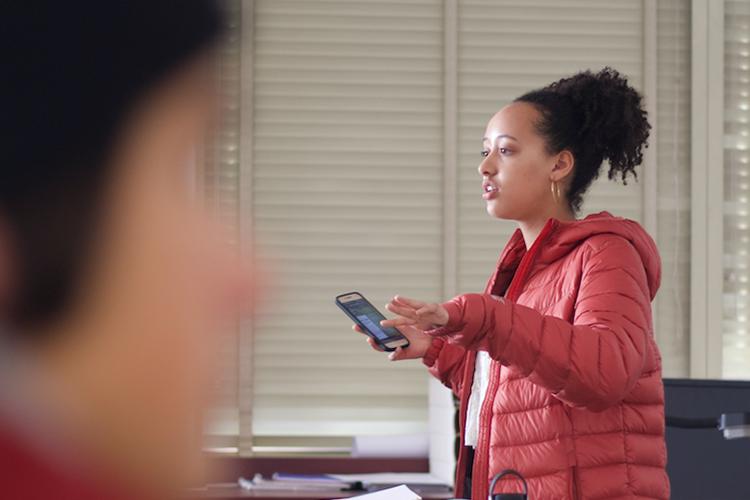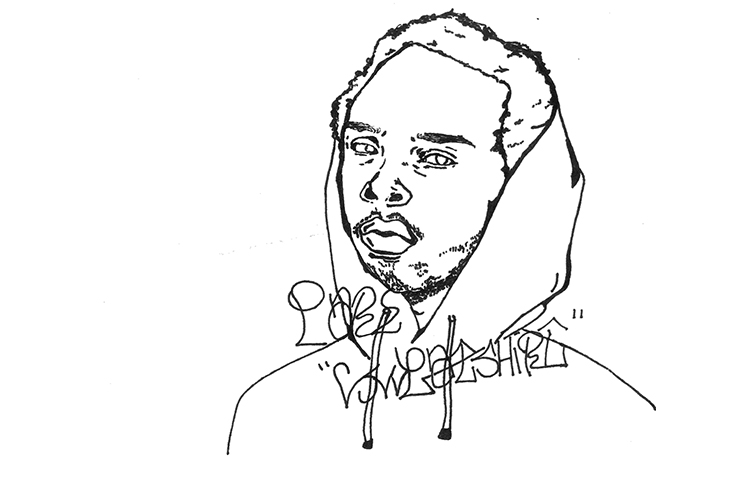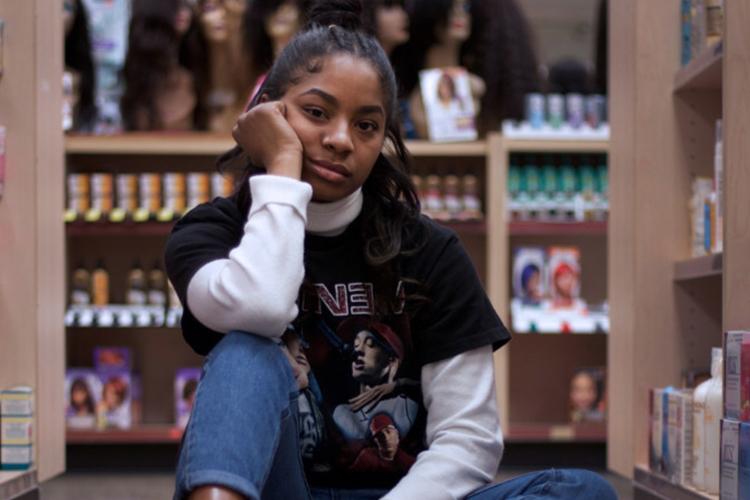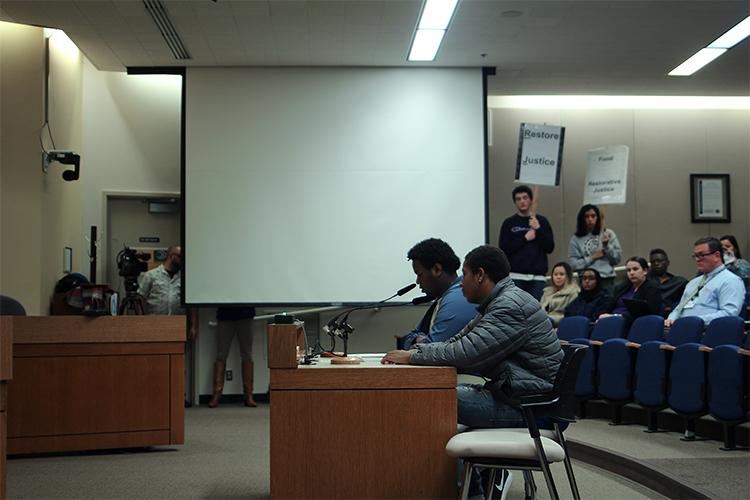
Then freshman Bernadette Robinson walks into the Grant High School library, with posters and signs covering the surrounding tables, advertising an overwhelming number of clubs. Despite being only a few weeks into school, Robinson had already heard multiple upperclassmen wish that they had joined clubs during their freshman year. Determined to avoid these regrets, Robinson dragged herself to the club fair.
Once in the room, the high-spirited energy lead Robinson to sign up for multiple clubs. Of her choices, Robinson could already tell that Environmental Club was a good fit for her. “All the people who were tabling (at the fair) were all like juniors and seniors and it was kind of intimidating. But the Environmental Club, there was like one or two people there and they seemed pretty approachable,” she says. “I just put my name down.”
Now, after two and a half years, Robinson’s primary focus has become the Environmental Club, where she organizes guest speaker visits and student-led projects to encourage environmental conservation. “Being involved in Environmental Club is something that I’m really proud of,” she says.
Yet with the United Nation’s 2018 climate change report predicting detrimental effects on the earth within 12 years, Robinson is scared that the world she grew up in will not be the same as the world she will have to live with. “I honestly don’t know if we’re going to have enough motivation as a country to do anything drastic in less than 12 years,” she says.
But Robinson tries to remain optimistic, hoping that her actions can contribute to making a positive change on the outcome.
Robinson’s determination hasn’t gone unnoticed to her Environmental Club peers. “She certainly works hard to sustain the club at times when other members are a little bit relaxed in doing it,” says Jack Binzer, fellow junior and Environmental Club member. “She cares very much about Environmental Club … She’s just a strong, solid leader overall that takes input from the group and leads very well.”
Despite her firm beliefs regarding the environment, much of the Grant community is unaware of her activism. While some Grant students post their opinions on social media and spark discussions in the classroom, Robinson is often deemed “quiet” by her peers.
But Robinson recognizes the impact her ideas could have if she were able to push past her insecurities of being judged by others. “I want to be vocal,” Robinson says. “(The environment is) always something that I’ve been interested in but it’s not always been something that I’ve been good at projecting, which is what I’m working on and trying to do.”
Now leader of the club, Robinson seized the opportunity to practice being more vocal about her passion for the environment and everything she learned. “I realized just how much (the environment) affects every aspect of our lives,” says Robinson. “Like … driving a car, just thinking about the effects that has, and then you know just thinking about the small things and how they add up and realizing that we’re all kind of interconnected with the planet
But Robinson hasn’t always been sure she wanted to be more outspoken.
Throughout her elementary and middle school years, Robinson let her self-consciousness get the best of her. Constantly worrying about what her classmates thought of her, Robinson kept her insecurities at the forefront of her mind. “I don’t know why but it was like, I was just so scared,” she says. “I cared a lot about what other people thought and … everything that I did was kind of like in thinking of what other people would think.”
In fear of judgement, Robinson felt she had to avoid drawing attention to herself at all costs. She would not raise her hand in class and, most of all, would not dare to share her opinions.
After joining an after-school band program at age 10, Robinson started playing the flute. Over the following years, the flute allowed Robinson to build confidence among her peers. “I kind of found something that I really liked and that’s always a good thing, finding something you genuinely enjoy and something that makes you happy,” she says. “I think that just boosted my confidence in like, any area.”
But despite building this base layer of confidence, Robinson still found herself shying away from the spotlight, refraining from being vocal throughout her daily life.
At home it was a different story. Robinson always felt comfortable and would often have conversations with her father surrounding his work with the United States Department of Agriculture as a water management engineer. Through these talks, Robinson was exposed to the subject of climate change. However, when she entered high school, Robinson was still unsure of her own personal beliefs on the topic.
When she joined Environmental Club, this exposure only intensified. Robinson found herself in long conversations with her father, during which he would describe his beliefs and teach her what he knew. “Having someone that I’m able to talk about things without feeling judged, and learning so much, it’s just so important to me and it’s really valuable,” says Robinson.
In Environmental Club, Robinson discovered a close-knit, intimate community that she had previously lacked at Grant. Robinson had tried to find her place elsewhere, signing up for Black Student Union (BSU), but her shy nature and the intimidating size of BSU made it difficult for her to feel like she was making an impact on the club.
However, with Environmental Club, Robinson not only developed close bonds with her peers, but she also found herself becoming more and more passionate about the group.
Robinson remembers thinking to herself, “I really care about (the environment).” With this realization, Robinson entered every club meeting with a new invigorated passion. “Even if it was really small, I wanted to make a little bit of an impact, and just know more about where I’m living and how we affect the environment,” says Robinson.
Upon reaching the end of her freshman year, the club leaders had taken notice of her passion for the topic and began asking her if she would be interested in becoming a co-club leader for her sophomore year. At first Robinson was hesitant, unsure of her capabilities. Convinced she was too young and inexperienced for a leadership position, she feared she lacked the ability to be vocal and lead the club. “Secretly I really wanted to, but it was just, like, that fear,” she says. “I guess it was holding me back a little bit, but I really did want to have a leadership position.”
Despite what she wanted, Robinson was prepared to reject their offer. “No one, I would say, would think … about me (as a leader), so in the end I was like, that’s not who I am.”
But the leaders were persistent. And after some talks with her future co-leader, then junior Eva Bailey, Robinson saw that she would not be facing the challenge alone. With this sense of security, Robinson accepted the position, knowing that she wanted to share her positive experiences with other people.
At the first Environmental Club meeting of her sophomore year, Robinson felt ready. Her co-leader took the primary role in the first meeting, allowing for Robinson to ease her way into the leadership position with small secondary comments to accompany everything Bailey said.

But fairly early into the year, Robinson was forced into a more primary role when her fellow leader’s participation became inconsistent, and, according to Binzer, she embraced it. “Bernadette, she was very persistent, she was consistent,” he says. “I feel like she settled into that role pretty quickly within sophomore year. Maybe she was getting used to it at the beginning of sophomore year, but ever since then she’s just been a terrific, strong leader.”
Outside of the club, Robinson often read about damage caused by climate change like the deadly wildfires tearing through California and the hurricanes in Houston. Then, when Robinson read the report saying that humans have 12 years to limit climate change, she became scared for the world’s future.
“I got so mad and I was so freaked out,” she says. “I just remember thinking, ‘We’re bad, we’re not doing anything.’”
Upon reading the climate change report, Robinson became even more motivated to do her part. “Everything with climate change and our planet, and when you read about the news or you learn something in (AP Environmental Science) and it just makes you feel really bad about being a person, but then I want some good to come out of it. So I think just wanting to do something decent just made me want to make an impact.”
Although Robinson’s work with climate change in school and on her own time motivated her, it was her first-hand experiences in Rwanda that truly gave her the grit to try and make change.
Having previously visited the city of Kigali to visit family, Robinson returned to Rwanda with her family in the summer before her junior year. This time, she suddenly became harshly aware of the environmental issues that surrounded the country, and even her grandmother’s kitchen.
“I noticed how much pollution was a problem in the city and how clean water wasn’t available to a lot of people, and I realized how it impacted my grandma,” says Robinson. “While my grandma was cooking, there was the wood fire, and it made the whole area smell really strong, and then people like our neighbors would be cooking at the same time, and so it would be really intense pollution for like half of the day. And that was just really uncomfortable.”
After these experiences in Rwanda, Robinson felt even more passionate about the climate. However, she acknowledged that the amount of work she could do there was limited. “It made me think, ‘You know, if I can’t do something directly in Rwanda, I might as well try to make where I’m living now a more sustainable place,’” she says.
Robinson prepared for a year of leading Environmental Club, more motivated than ever.
Now, as head of Environmental Club, Robinson continues to guide weekly conversations about the environment, oversee student-run projects, provide volunteer opportunities and lead brainstorming sessions with the hopes of providing eco-friendly tactics for Grant students. She frequently invites workers who pursue occupations in the environmental field as guest speakers to share their experiences.
Robinson is proud of the personal progress she has made since joining Environmental Club as a freshman. “I used to be really scared of (public speaking) but now it’s not a big deal to me because if I know what I’m gonna be talking about, if I just feel comfortable talking about what I believe or what I know, it’s gonna be fine,” Robinson says. “I’m just a lot more comfortable than I was freshman year, a lot more.”
The confidence Robinson has gained has encouraged her to become more independent in her thinking as well. In earlier years, Robinson had depended on her father to guide her opinions, unsure of her own ideas. “I sometimes wonder about how much influence I’ve had on her,” says Peter Robinson, Robinson’s father. “I’m an engineer, and she (would say), ‘Well I want to go into engineering school,’ and I kind of figured that was just like she wanted to make me happy. And now, I think she’s more of her own person.”

Despite everything she’s already achieved, Robinson doesn’t see herself stopping anytime soon. One of Robinson’s goals is to call herself an activist, but as of now she feels that she still lacks the necessary qualities. “Whenever I hear that word, I’m like, ‘Oh that’s a title for really cool people, like who do really great things,’” she says. “So I don’t really think of myself as an activist. I feel like I don’t do enough to call myself that.”
Robinson also hopes to further her education in the issues she is passionate about. Intrigued by the ties between the environment and public health, Robinson hopes to study environmental science in college as well. In doing so, Robinson wants to return to Rwanda after graduating from Grant, this time staying for a longer period of time.
For the time being, however, she strives to make a local impact. Interested in joining the Portland Youth Climate Council, Robinson plans to raise enough awareness and educate people on the changing climate, in time to make a difference.
Robinson believes that if the United States were to prioritize environmental conservation, a change could be made. “Investing billions of dollars in like, green infrastructure, investing in renewable energy, and (enacting) a carbon tax and really controlling our carbon emission. I think those things, if we do it on a large scale, that’s great,” she says.
“I think that a country that is as big and powerful as the U.S., if we do things like that, if we implement a ton of environmental regulations about what we put into our environment, I think other countries will follow because we’re pretty influential I think,” she adds. “If we do that, I think we can solve it.”



































